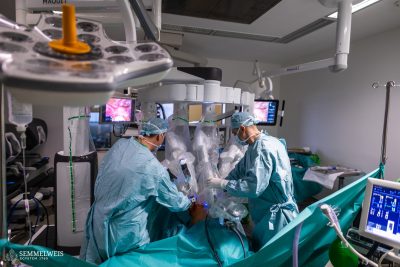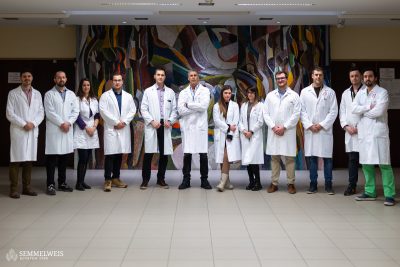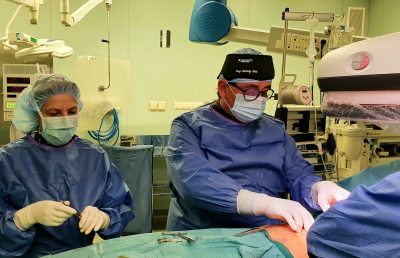As Dr. Ildikó Kalina, chief physician, Head of the MRI Lab, informed us, currently 15-25 examinations are performed on a daily basis at the MRI Lab of the Department of Radiology at Semmelweis University. According to Dr. Kalina both the clinic and the laboratory take part in the graduate and postgraduate education, thus with the training of professionals they intend to extend their capacities. There has been an MRI machine at the Department of Radiology since 2016 May. Besides this clinic, there are two other MRI machines at Semmelweis University: at the Heart and Vascular Centre as well as at the MR Research Center.
 “Magnetic resonance imaging is currently the most reliable radiological method in case of several disease patterns, with the help of which numerous body parts or even organs can be examined when other diagnostic imaging examinations (X-ray, ultrasound, CT) cannot provide clear-cut information. Among other things, the MRI scan is perfectly suited for the diagnostics of rheumatoid injuries, diseases related to the nervous system, malformations and the determination of the stadium of tumours. This machine provides a huge assistance in making a diagnosis as accurate as possible in the decision of the required treatment. About the condition of the blood vessels the MRA (Magnetic Resonance Angiogram) can provide information. Intravenous contrast agent is not only applied for the amelioration of the tissue resolution power, but also for the cancer stage examination of the particular organ in case of dynamic contrast agent examinations, as a part of multi-parametric MRI diagnostic imaging. In the case of certain organs, such as the prostate, a so called spectroscopy can be performed as an additional examination. This means that with the help of the measurement of the pathological misalignments of metabolic pathways one can deduce the existence of certain mutations, thus besides anatomical and functional diagnostic imaging there is an opportunity for biochemical analysis on the molecular level as well.”, expressed Dr. Kalina.
“Magnetic resonance imaging is currently the most reliable radiological method in case of several disease patterns, with the help of which numerous body parts or even organs can be examined when other diagnostic imaging examinations (X-ray, ultrasound, CT) cannot provide clear-cut information. Among other things, the MRI scan is perfectly suited for the diagnostics of rheumatoid injuries, diseases related to the nervous system, malformations and the determination of the stadium of tumours. This machine provides a huge assistance in making a diagnosis as accurate as possible in the decision of the required treatment. About the condition of the blood vessels the MRA (Magnetic Resonance Angiogram) can provide information. Intravenous contrast agent is not only applied for the amelioration of the tissue resolution power, but also for the cancer stage examination of the particular organ in case of dynamic contrast agent examinations, as a part of multi-parametric MRI diagnostic imaging. In the case of certain organs, such as the prostate, a so called spectroscopy can be performed as an additional examination. This means that with the help of the measurement of the pathological misalignments of metabolic pathways one can deduce the existence of certain mutations, thus besides anatomical and functional diagnostic imaging there is an opportunity for biochemical analysis on the molecular level as well.”, expressed Dr. Kalina.
 As Dr. Kalina describes, MRI provides opportunity for the Department of Radiology to tighten the relations and the cooperation with the clinical professionals of Semmelweis University. According to the current scientific findings MRI does not cause any harm in the body, so this type of examination can be applied for children and pregnant women as well, and the examination can be taken multiple times. However, there is a need for the patient’s positive attitude and cooperation, since the time frame of the examination – depending on its type – can vary between 20-50 minutes.
As Dr. Kalina describes, MRI provides opportunity for the Department of Radiology to tighten the relations and the cooperation with the clinical professionals of Semmelweis University. According to the current scientific findings MRI does not cause any harm in the body, so this type of examination can be applied for children and pregnant women as well, and the examination can be taken multiple times. However, there is a need for the patient’s positive attitude and cooperation, since the time frame of the examination – depending on its type – can vary between 20-50 minutes.
Eszter Keresztes
Photo: Attila Kovács, Semmelweis University
Translated by: Katalin Romhányi


